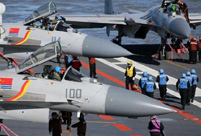

US Secretary of State John Kerry says goodbye as he boards his plane in Vientiane, Laos, Jan 25, 2016, before leaving for Phnom Penh, Cambodia. [Photo/Agencies]
Chinese and American experts have low expectations for US Secretary of State John Kerry's trip to China, Laos and Cambodia, where he is seen as trying to seek Beijing's support to punish the Democratic Republic of Korea for its latest nuclear test while looking for countries in Southeast Asia to gang up on China over the South China Sea issue.
Chinese Foreign Ministry spokeswoman Hua Chunying announced on Monday Kerry's trip to Beijing from Tuesday to Wednesday, a trip that she said "China hopes to help deepen communications on a series of important issues and promote coordination and cooperation in various fields".
Kerry began his tour in the Laotian capital of Vientiane on Sunday and then Phnom Penh, Cambodia. A senior State Department official on Sunday described China as the dominant player in the two countries, both economically and politically.
Over the years, the two countries have long opposed US efforts to rally ASEAN (Association of Southeast Asian Nations) against China on the South China Sea issue.
In a background briefing, the senior official described Kerry's trip to Laos and Cambodia as laying the groundwork for the summit that the US President Barack Obama will be hosting at the Sunnylands retreat in California from Feb 15-16 with the 10 ASEAN leaders.
Laos is the chair of ASEAN in 2016. Obama hosted Chinese President Xi Jinping at Sunnylands in June 2013.
Many Chinese believe that the US is biased in handling the maritime territorial disputes in both the South and East China seas.
It was reported that Kerry's trip to Beijing was added after the DPRK declared on Jan 6 that it had successfully tested a hydrogen bomb.
The US believes the test was not a powerful hydrogen bomb, but it has been pushing for stronger United Nations Security Council sanctions on North Korea and also hopes China would use more of its leverage unilaterally.
"It almost goes without saying that the issue of the DPRK and its recent nuclear test will be on the top of the agenda," said the senior State Department official, adding that the South China Sea is also "very much on the secretary's mind and something that he will certainly discuss in depth".
According to the official, Washington believes that China has so far not exerted enough pressure on the DPRK and that it is important for China to join the US, the Republic of Korea and Japan in presenting a unified front.
Ted Carpenter, a senior fellow of defense and foreign policy studies at the Cato Institute, described the US policy as "incredibly arrogant, short-sighted".
He said deciding to place more pressure on Pyongyang entails various risks for Beijing, while the United States and its East Asian allies would be the principal beneficiaries. China's leaders will be reluctant to adopt such a course even under the most favorable circumstances.
"Beijing certainly is not likely to take such risks if the United States is simultaneously trying to organize the ASEAN countries into an anti-China bloc. Kerry should grasp that reality," Carpenter told China Daily on Monday.
 |
 A foreign girl explains what China should be proud of
A foreign girl explains what China should be proud of Chinese navy's air-cushioned landing craft in pictures
Chinese navy's air-cushioned landing craft in pictures Chinese pole dancing master opens class in Tianjin
Chinese pole dancing master opens class in Tianjin PLA holds joint air-ground military drill
PLA holds joint air-ground military drill Charming female soldiers on Xisha Islands
Charming female soldiers on Xisha Islands Beautiful skiers wear shorts in snow
Beautiful skiers wear shorts in snow Getting close to the crew on China's aircraft carrier
Getting close to the crew on China's aircraft carrier Chinese stewardess celebrate test flight at Nansha Islands
Chinese stewardess celebrate test flight at Nansha Islands Pentagonal Mart becomes the largest vacant building in Shanghai
Pentagonal Mart becomes the largest vacant building in Shanghai Top 20 hottest women in the world in 2014
Top 20 hottest women in the world in 2014 Top 10 hardest languages to learn
Top 10 hardest languages to learn 10 Chinese female stars with most beautiful faces
10 Chinese female stars with most beautiful faces China’s Top 10 Unique Bridges, Highways and Roads
China’s Top 10 Unique Bridges, Highways and Roads ‘The Monkey King’ sequel leaps ahead of original
‘The Monkey King’ sequel leaps ahead of original Snow my God! Fun times during China’s deep freeze
Snow my God! Fun times during China’s deep freeze Telecom scammers cheat victims out of thousands of yuan
Telecom scammers cheat victims out of thousands of yuan Homeless people try to survive subzero temperatures in Beijing
Homeless people try to survive subzero temperatures in BeijingDay|Week